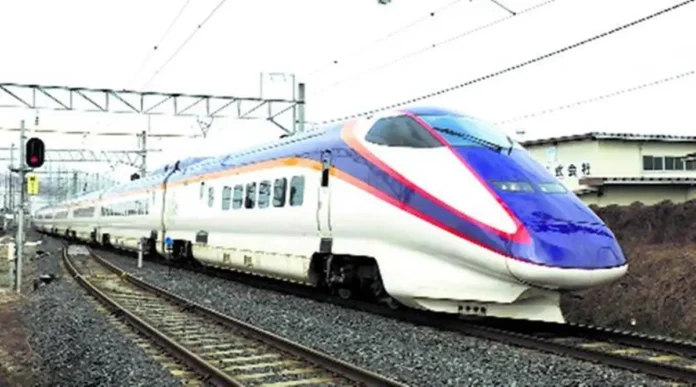Maharashtra’s Palghar and Thane districts have set the stage for the implementation of the ambitious Bullet Train project. The commencement of this project marks a pivotal moment not only for the region but also for India as it embraces high-speed rail technology to enhance connectivity and stimulate economic growth.
The Bullet Train project, envisioned as a joint venture between India and Japan, aims to establish a high-speed rail corridor between Mumbai and Ahmedabad, two major economic hubs in the western region of India. The corridor, spanning approximately 508 kilometers, promises to revolutionize intercity travel by reducing travel time between the two cities from hours to a mere few, significantly enhancing passenger experience and efficiency.
The initiation of construction activities in Palghar and Thane districts signifies the tangible progress made towards realizing this transformative project. These districts, strategically located along the proposed route, play a crucial role in facilitating the smooth implementation of the Bullet Train corridor. Palghar, known for its burgeoning industrial sector and proximity to Mumbai, serves as a vital node in the transportation network, while Thane, a bustling urban center, serves as a key transit point for commuters traveling to and from Mumbai.
The Bullet Train project holds immense promise in terms of socio-economic benefits for the region. Apart from enhancing connectivity between Mumbai and Ahmedabad, it is poised to generate employment opportunities, stimulate economic development, and catalyze urban growth along the corridor. The construction phase alone is expected to create a multitude of job opportunities spanning various skill sets, thereby bolstering local economies and fostering inclusive growth.
Moreover, the advent of high-speed rail infrastructure is set to revolutionize the concept of urban mobility, offering commuters a fast, safe, and environmentally sustainable mode of transportation. By alleviating congestion on existing road and rail networks, the Bullet Train corridor not only enhances travel efficiency but also reduces carbon emissions, contributing to India’s commitment to sustainable development and environmental stewardship.
The Bullet Train project is a testament to the growing collaboration between India and Japan in the realm of infrastructure development. Leveraging Japan’s expertise in high-speed rail technology, India aims to not only bridge the infrastructure gap but also foster knowledge exchange and capacity building in the transportation sector. The project underscores the importance of international cooperation in realizing ambitious endeavors that transcend national boundaries and propel socio-economic progress.
However, the Bullet Train project is not without its share of challenges and controversies. Critics have raised concerns regarding land acquisition, environmental impact, and cost overruns associated with the project. Ensuring adequate compensation for landowners, mitigating ecological disruptions, and adhering to stringent safety and quality standards are imperative to address these concerns and garner public support for the project.
Moreover, the successful implementation of the Bullet Train project hinges on effective project management, stakeholder engagement, and timely execution. Robust coordination between government agencies, private stakeholders, and local communities is essential to overcome logistical hurdles and expedite construction activities. Transparency, accountability, and adherence to best practices in project governance will be instrumental in navigating complexities and ensuring the project’s success.
As Maharashtra’s Palghar and Thane districts embark on the journey towards high-speed rail connectivity, they stand poised to reap the manifold benefits of this transformative initiative. The Bullet Train project represents not only a leap forward in transportation infrastructure but also a symbol of India’s aspirations for progress, innovation, and inclusive development. By embracing cutting-edge technology and forging international partnerships, India is charting a new course towards a more connected, prosperous, and sustainable future.
In a nutshell, the commencement of construction activities for the Bullet Train project in Maharashtra’s Palghar and Thane districts heralds a new era in India’s transportation landscape. As the project gathers momentum, it holds the promise of revolutionizing intercity travel, stimulating economic growth, and fostering closer ties between regions. With concerted efforts and unwavering commitment, India is poised to realize its vision of a modern, efficient, and inclusive transportation network powered by high-speed rail technology.

